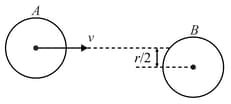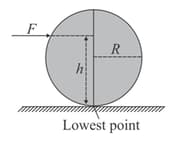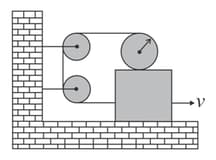Embibe Experts Solutions for Chapter: Centre of Mass, Momentum and Collisions, Exercise 2: Exercise-2
Embibe Experts Physics Solutions for Exercise - Embibe Experts Solutions for Chapter: Centre of Mass, Momentum and Collisions, Exercise 2: Exercise-2
Attempt the practice questions on Chapter 9: Centre of Mass, Momentum and Collisions, Exercise 2: Exercise-2 with hints and solutions to strengthen your understanding. Beta Question Bank for Engineering: Physics solutions are prepared by Experienced Embibe Experts.
Questions from Embibe Experts Solutions for Chapter: Centre of Mass, Momentum and Collisions, Exercise 2: Exercise-2 with Hints & Solutions
A disk of radius moving on perfectly smooth surface at a speed undergoes an elastic collision with an identical stationary disk . Find the velocity of the disk after collision if the impact parameter is as shown in the figure:-

A spherical ball of mass moving with a uniform speed of collides symmetrically with two identical spherical ball of mass each at rest touching each other. If the two balls move with in two directions at the same angle of with the direction of the first ball, the loss of kinetic energy on account of the collision is:-
A smooth sphere of mass collides elastically with an identical sphere at rest. The velocity of before collision is in a direction making with the line of centre at the time of impact.
A particle moving with kinetic energy makes an elastic head-on collision with a stationary particle which has twice its mass. During the impact:-
A bag of mass hangs by a long thread and a bullet (mass ) comes horizontally with velocity and gets caught in the bag. Then for the combined system (bag + bullet):-
A solid sphere of radius is placed on smooth horizontal surface. A horizontal force is applied at height from the lowest point. For the maximum acceleration of centre of mass, which is correct-

A slender uniform rod of length is balanced vertically at a point on a horizontal surface having some friction. If the top of the rod is displaced slightly to the right, the position of its centre of mass at the time when the rod becomes horizontal.
In the figure shown, the plank is being pulled to the right with a constant speed . If the cylinder does not slip then

